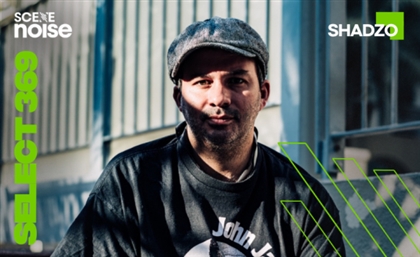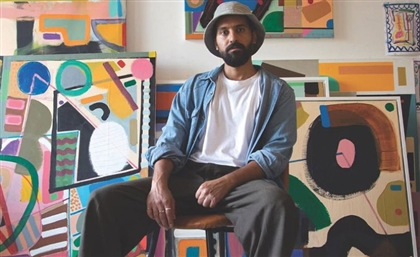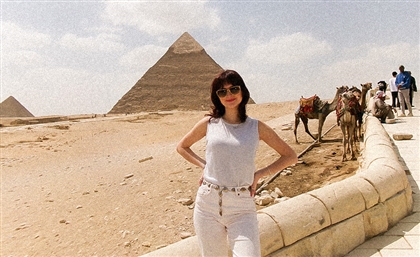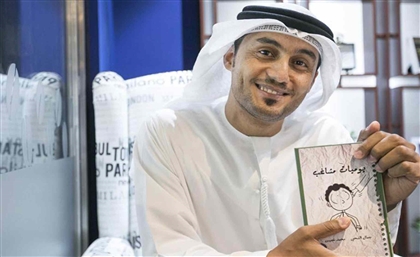NEST: The Project Nurturing A New Generation of Palestinian Artists
We sat with Samer Jaradat, founder of Jafra Productions, to discuss the works of its NEST project, and how it plans to protect the future of the music industry in Palestine.
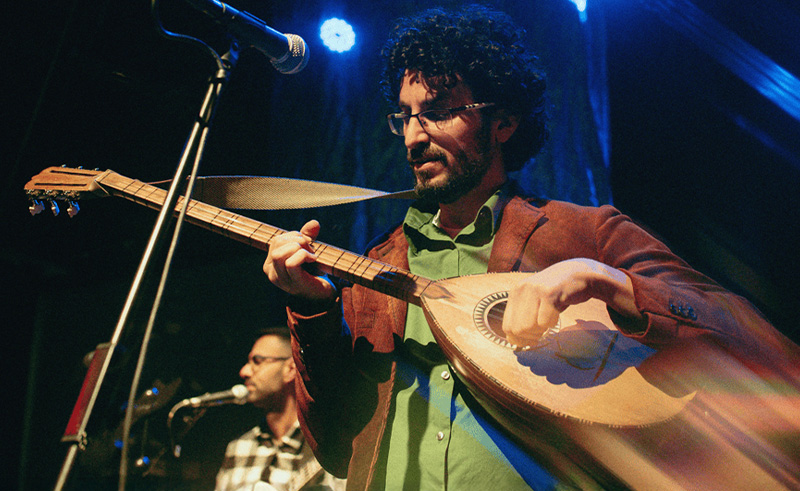
In Palestine’s occupied West Bank, right in the heart of Ramallah, Jafra Productions, an independent music label and artist incubation business, have been actively forming the building blocks of a solid music ecosystem since 2010. Despite the ongoing genocide at the hands of the Israeli occupation and the constraints of censorship, the organization has managed to play a pivotal role in fostering a Palestinian music community, nurturing both emerging and established artists and forging connections with global industry professionals.
In 2022, Jafra Productions launched its NEST Music Incubator, a regional project dedicated to equipping artists with the resources necessary to build sustainable careers and establish themselves in the global music industry.
The project is a comprehensive seven-month program that provides artists with personalized mentorship, production support, live performances and networking opportunities with global heavyweights in the music industry. Building on the success of its inaugural edition between 2022 and 2023, this year NEST is expanding its scope, offering aspiring musicians not just mentorship and studio time, but deals with regional record labels and partnerships with global distribution companies and booking agencies.
With its expanded network, comprehensive program, and focus on long-term artist development, Jafra Productions’ NEST Music Incubator is not just nurturing new sounds, it’s building a stronger, more sustainable music ecosystem.
NEST has recently announced the open call for the next cycle of the program.
SceneNoise sat down with Samer Jaradat, founder behind Jafra Productions, to discuss the works of NEST, and how it plans to protect the future of the music industry in Palestine.

What’s NEST in a nutshell?
NEST Music Incubator in Palestine is a comprehensive 7-month program designed to empower Palestinian music creators in building, growing and sustaining successful careers. Our mission is to export Palestinian music to the global stage, by supporting talents with personalized mentorship, production support, live performances and networking opportunities within the global music industry.
We’re not a company signing artists to have full control over their catalogues. We’re focusing on the actual music community in Palestine and building a sort of solid ecosystem. So, NEST is not an intensive crash course, but rather an extensive series of workshops and mentorships over an extended period of time, giving the artists more time to thrive, work on their skills, make mistakes, get up again and learn more. It’s a very slow process to help artists develop their careers in a very healthy and sustainable way that guarantees their success.
Realistically speaking, given that we are in Palestine, we need to be mindful that tomorrow will be a different day. So, it needs to be this slow.

Can you walk us through the curriculum of the program and how is it designed?
Okay. So, the program is implemented through three different phases or stages, allowing participants to focus on one area at a time and assess their development and eligibility for each stage.
The first phase, we call it ‘Global Beats’. It’s an eight-week deep dive into the global and regional music ecosystem, featuring educational workshops led by international and local music experts, that cover topics such as publishing, copyrights, the difference between recorded and live music and so on. Basically, it helps artists gain a global perspective, from a business perspective, on how to navigate their music career.
The second phase is the ‘SoundLab’, and this is where we help artist bring their music to life. We provide them with production support, and mentorships with producers and global musicians, giving them an opportunity to meet, collaborate and network with industry professionals. In that phase, an external committee of experts select the artists eligible to advance to the program’s third phase.
The third phase is the ‘Sustainable Future’. In this final phase, artists showcase their music live and get to pitch it to a wide range of regional record labels and industry professionals to secure deals. They have the freedom to select deals with labels that align with their vision and career goals.

What happens after the seven-month time frame?
We continue to provide a minimum of three years of incubation to ensure sustained growth for the artists. This comes in the form of providing them with ongoing resources, strategic support, and in-person mentorship for continuous development.
Do you host the program in Ramallah?
Jafra Productions is based in Ramallah and its core infrastructure, but we run the program all over Palestine, including the West Bank, Jerusalem, Gaza, the 48 area, and the occupied Golan Heights
Given the ongoing Israeli occupation and its accelerated attacks across Palestine, how do you manoeuvre operating and organizing the program amidst these circumstances?
It’s very challenging of course. It’s not only challenging to get visas for the artists, speakers, and mentors who are coming from abroad but also for local artists in Palestine. You know, with the restriction on their movement and all of these checkpoints everywhere and so on. So, we try our best to adapt to that, by hosting most of the workshops, talks or mentorships, online for those who can’t make it physically. It is very stressful, but we manage to do it.
You know, after COVID, online has kind of become quite normal. So, it’s fine.
From another point of view, we feel a greater responsibility to sustain the creative growth of Palestinians, support the diversity of our music scene, which is naturally diverse, and maintain a narrative that is absolutely impossible to erase or hide, no matter the powers from above.
How can an artist sign up for NEST’s program?
We launch the cycle with an open call, where everyone gets to apply. Then, we select the candidates we see fit to join the program.
What is the strategy you adhere to in the selection process? And, do you focus on certain music genres or skills in the artists you select?
No, we don’t focus on certain music genres. We try to select a diverse range of talents, whether they are solo artists, bands/collectives, or emerging or established performers looking to grow and develop their careers. We’re always aware of being inclusive and providing equitable opportunities for both male and female artists –especially in the context of Palestine and the region at large, everyone’s voice and talent are important and matter. Those are the two things that we always have in the back of our minds when selecting.
But, there is a general rule that we focus on as well, which is seeing if they are ready to expand outside because they have to be able to have the basic knowledge and skill set that will enable them to survive within the music industry and establish their mark. They must be self-sustainable. They have to have the mindset to embark on this challenging journey and be super clear about their artistic identity. It’s essential for them to know their positioning and be aware of what position they want to take, not only within the region but also on a global level.
And, obviously, if they have the talent and their music is good.
Given that NEST is one of Jafra Productions’ initiatives, how does the company play a role in this program?
We do the production needed in-house with Jafra Productions. And, although we are not a huge team at the moment, we have partnered with Believe (Arabia), which has been a crucial partner in assisting and advising us on our distribution strategy and relationship with the major digital streaming providers, such as Spotify and Anghami. We also have partnerships with booking agencies across the MENA region, Europe –with great support in the French market - and the United States. So, this enables us to provide the artists with marketing and PR advice from professionals, while also getting them record deals and gigs. Like all the services and resources needed for them to kick-start their careers professionally.
You’ve recently announced the open call for NEST’s second cycle. Is this new cycle different in any way from the previous one you did?
It’s much bigger than the one before on different levels. At first, the artists who made it to the final phase of the program didn’t have several options of record labels to choose from –we would sign them with Jafra Productions automatically after they finished the program. This year, though, we’re bringing in several regional and international record labels and professionals, giving artists multiple opportunities to choose from, depending on their musical style and career goals. Through our partnership with the French Development Agency (AFD), we had the chance to develop solid relationships with some of the most active industry players in France. This allows us to bridge these connections and gaps with the Palestinian scene on different levels, creating partnerships and business opportunities.
In terms of the talks and workshops, this year, we’re focusing more on educating the artists about copyrights, providing them with tips and insights on how they can protect their music and work. Because, there is no CMO in Palestine, you know. It’s a dream and something that has been in the works for years.
We’re also going to have a lot of diverse topics for this cycle, tackling intellectual problems from publishing to artists’ communities and the impact of technology on music. Last year, it was more like presentations or keynotes, but this year, we’re planning for a round table discussion and Q&A sessions, a typical set-up of a class so it is more interactive.
Looking ahead, how do you envision the future of NEST and what are your long-term plans for it? Will you remain focusing on Palestinian artists only, or are there plans for regional expansion in the pipeline?
NEST is now assuming its position as a regional incubator, and soon it will be implemented in different countries across the MENA. NEST Jordan is currently running alongside Palestine, with other countries to follow as soon as the conditions are gathered. Each NEST program is set to operate as an independent and localized entity, implemented through local partners to address the specific needs of the local music scene while aligning with the broader regional vision. This expansion is happening now through various partners supporting our vision in Palestine and beyond, primarily the French Development Agency (AFD) and Expertise France.
- Previous Article UAE’s GDP Projected to Exceed USD 462.8 Billion in 2025
- Next Article January 7th Declared Paid Public Holiday for Copic Christmas
Trending This Week
-
Dec 27, 2025







